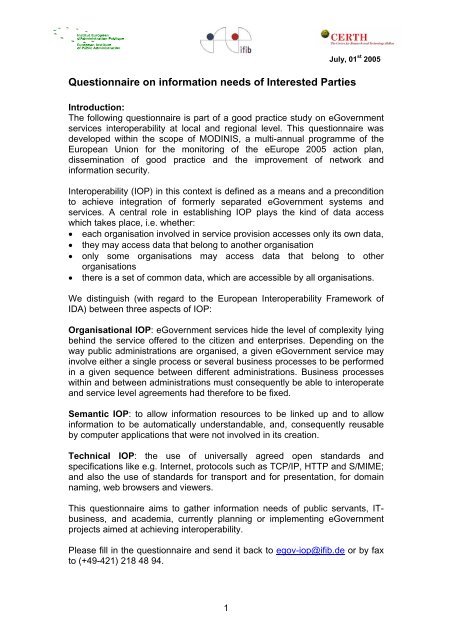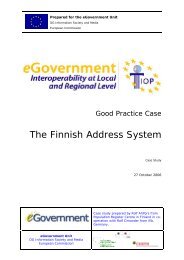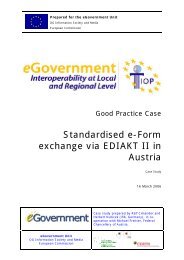Draft questionnaire for stakeholders II – CERTH proposal - Study on ...
Draft questionnaire for stakeholders II – CERTH proposal - Study on ...
Draft questionnaire for stakeholders II – CERTH proposal - Study on ...
You also want an ePaper? Increase the reach of your titles
YUMPU automatically turns print PDFs into web optimized ePapers that Google loves.
July, 01 st 2005<br />
Questi<strong>on</strong>naire <strong>on</strong> in<str<strong>on</strong>g>for</str<strong>on</strong>g>mati<strong>on</strong> needs of Interested Parties<br />
Introducti<strong>on</strong>:<br />
The following <str<strong>on</strong>g>questi<strong>on</strong>naire</str<strong>on</strong>g> is part of a good practice study <strong>on</strong> eGovernment<br />
services interoperability at local and regi<strong>on</strong>al level. This <str<strong>on</strong>g>questi<strong>on</strong>naire</str<strong>on</strong>g> was<br />
developed within the scope of MODINIS, a multi-annual programme of the<br />
European Uni<strong>on</strong> <str<strong>on</strong>g>for</str<strong>on</strong>g> the m<strong>on</strong>itoring of the eEurope 2005 acti<strong>on</strong> plan,<br />
disseminati<strong>on</strong> of good practice and the improvement of network and<br />
in<str<strong>on</strong>g>for</str<strong>on</strong>g>mati<strong>on</strong> security.<br />
Interoperability (IOP) in this c<strong>on</strong>text is defined as a means and a prec<strong>on</strong>diti<strong>on</strong><br />
to achieve integrati<strong>on</strong> of <str<strong>on</strong>g>for</str<strong>on</strong>g>merly separated eGovernment systems and<br />
services. A central role in establishing IOP plays the kind of data access<br />
which takes place, i.e. whether:<br />
• each organisati<strong>on</strong> involved in service provisi<strong>on</strong> accesses <strong>on</strong>ly its own data,<br />
• they may access data that bel<strong>on</strong>g to another organisati<strong>on</strong><br />
• <strong>on</strong>ly some organisati<strong>on</strong>s may access data that bel<strong>on</strong>g to other<br />
organisati<strong>on</strong>s<br />
• there is a set of comm<strong>on</strong> data, which are accessible by all organisati<strong>on</strong>s.<br />
We distinguish (with regard to the European Interoperability Framework of<br />
IDA) between three aspects of IOP:<br />
Organisati<strong>on</strong>al IOP: eGovernment services hide the level of complexity lying<br />
behind the service offered to the citizen and enterprises. Depending <strong>on</strong> the<br />
way public administrati<strong>on</strong>s are organised, a given eGovernment service may<br />
involve either a single process or several business processes to be per<str<strong>on</strong>g>for</str<strong>on</strong>g>med<br />
in a given sequence between different administrati<strong>on</strong>s. Business processes<br />
within and between administrati<strong>on</strong>s must c<strong>on</strong>sequently be able to interoperate<br />
and service level agreements had there<str<strong>on</strong>g>for</str<strong>on</strong>g>e to be fixed.<br />
Semantic IOP: to allow in<str<strong>on</strong>g>for</str<strong>on</strong>g>mati<strong>on</strong> resources to be linked up and to allow<br />
in<str<strong>on</strong>g>for</str<strong>on</strong>g>mati<strong>on</strong> to be automatically understandable, and, c<strong>on</strong>sequently reusable<br />
by computer applicati<strong>on</strong>s that were not involved in its creati<strong>on</strong>.<br />
Technical IOP: the use of universally agreed open standards and<br />
specificati<strong>on</strong>s like e.g. Internet, protocols such as TCP/IP, HTTP and S/MIME;<br />
and also the use of standards <str<strong>on</strong>g>for</str<strong>on</strong>g> transport and <str<strong>on</strong>g>for</str<strong>on</strong>g> presentati<strong>on</strong>, <str<strong>on</strong>g>for</str<strong>on</strong>g> domain<br />
naming, web browsers and viewers.<br />
This <str<strong>on</strong>g>questi<strong>on</strong>naire</str<strong>on</strong>g> aims to gather in<str<strong>on</strong>g>for</str<strong>on</strong>g>mati<strong>on</strong> needs of public servants, ITbusiness,<br />
and academia, currently planning or implementing eGovernment<br />
projects aimed at achieving interoperability.<br />
Please fill in the <str<strong>on</strong>g>questi<strong>on</strong>naire</str<strong>on</strong>g> and send it back to egov-iop@ifib.de or by fax<br />
to (+49-421) 218 48 94.<br />
1
1. Please state the name of your project and provide a short descripti<strong>on</strong><br />
including a web link if appropriate<br />
Name:<br />
Descripti<strong>on</strong> (about two sentences):<br />
Web link:<br />
2. Please state your c<strong>on</strong>tact details<br />
Your name:<br />
Organisati<strong>on</strong>:<br />
City and country:<br />
Email:<br />
Ph<strong>on</strong>e-No.:<br />
3. What stakeholder group do you represent?<br />
You represent which stakeholder group?<br />
Public administrati<strong>on</strong><br />
- at local level<br />
- at regi<strong>on</strong>al level<br />
- at nati<strong>on</strong>al level<br />
- Other (please specify)<br />
IT-business<br />
- Software development<br />
- C<strong>on</strong>sultancy<br />
- Computing centre<br />
- IT industry associati<strong>on</strong><br />
- Other (please specify)<br />
Academia<br />
- Which area? (please specify)<br />
tick box<br />
4. In which policy area and services with regard to interoperability are you<br />
most interested in? Rank ‘1’ <str<strong>on</strong>g>for</str<strong>on</strong>g> the most important, ‘2’ <str<strong>on</strong>g>for</str<strong>on</strong>g> the sec<strong>on</strong>d<br />
important and so <strong>on</strong>.<br />
Please indicate the policy area and services of most interest<br />
Ec<strong>on</strong>omy and Labour<br />
Police, security and justice<br />
Infrastructure (transportati<strong>on</strong>, c<strong>on</strong>structi<strong>on</strong> and housing)<br />
Educati<strong>on</strong>, science and research<br />
Envir<strong>on</strong>ment, agriculture and c<strong>on</strong>sumer protecti<strong>on</strong><br />
State and society (eParticipati<strong>on</strong>, eDemocracy, civil society)<br />
Social affairs (health, pensi<strong>on</strong>s, social security, etc.)<br />
Taxes and Customs<br />
General purpose<br />
Other, which?...<br />
Ranking<br />
2
5. Which aspect of interoperability (IOP) is the <strong>on</strong>e you would like to learn<br />
more about? Rank ‘1’ <str<strong>on</strong>g>for</str<strong>on</strong>g> the most important, ‘2’ <str<strong>on</strong>g>for</str<strong>on</strong>g> the sec<strong>on</strong>d important<br />
and so <strong>on</strong>.<br />
For which aspect of IOP would you like more in<str<strong>on</strong>g>for</str<strong>on</strong>g>mati<strong>on</strong>?<br />
Organisati<strong>on</strong>al IOP e.g. processes that should be changed or<br />
adapted or improved etc.<br />
Semantic IOP e.g. agreement <strong>on</strong> comm<strong>on</strong> <str<strong>on</strong>g>for</str<strong>on</strong>g>mats <strong>on</strong> data<br />
exchanges etc.<br />
Technical IOP e.g. technologies available, technical standards<br />
etc.<br />
Ranking<br />
6. Which other c<strong>on</strong>cerns around IOP are of interest to you? Rank ‘1’ <str<strong>on</strong>g>for</str<strong>on</strong>g> the<br />
most important, ‘2’ <str<strong>on</strong>g>for</str<strong>on</strong>g> the sec<strong>on</strong>d important and so <strong>on</strong>.<br />
Which other c<strong>on</strong>cerns around IOP are of interest to you?<br />
Legal, e.g. changes in laws, regulati<strong>on</strong>s etc.<br />
Cultural, e.g. resistance from public servants etc.<br />
Social, e.g. social inclusi<strong>on</strong> etc.<br />
Security, e.g. signatures, encrypti<strong>on</strong>s, etc.<br />
Other (please specify):<br />
Other (please specify):<br />
Ranking<br />
7. Which phase of an interoperability project is the <strong>on</strong>e you would like to<br />
learn more about? Rank ‘1’ <str<strong>on</strong>g>for</str<strong>on</strong>g> the most important, ‘2’ <str<strong>on</strong>g>for</str<strong>on</strong>g> the sec<strong>on</strong>d<br />
important and so <strong>on</strong>.<br />
For which phase of an IOP project would you like more info? Ranking<br />
Strategic plan, e.g. benefits, policy etc.<br />
How to c<strong>on</strong>ceptualise an IOP project, e.g. what to c<strong>on</strong>sider,<br />
potential, objective, barriers<br />
How to set up an IOP project, e.g. guidelines, resources,<br />
support, business plan etc.<br />
How to implement an IOP project, e.g. technologies, issues to<br />
c<strong>on</strong>sider, risks etc.<br />
How to disseminate and promote the results to politicians and<br />
decisi<strong>on</strong> makers<br />
How to create awareness of users and take-up<br />
Other (please specify):<br />
Other (please specify):<br />
3
8. Regarding objectives, what kind of interoperability project are you most<br />
interested in? Rank ‘1’ <str<strong>on</strong>g>for</str<strong>on</strong>g> the most important, ‘2’ <str<strong>on</strong>g>for</str<strong>on</strong>g> the sec<strong>on</strong>d important<br />
and so <strong>on</strong>.<br />
Regarding objectives, what kind of IOP projects are you<br />
most interested in?<br />
Projects aiming to data sharing by different authorities<br />
Projects aiming to data sharing by same authorities in different<br />
areas (or regi<strong>on</strong>s)<br />
Projects where interoperability is achieved between different<br />
stages of a service that involve different authorities<br />
Projects where auxiliary services (e.g. payment, authenticati<strong>on</strong>)<br />
are integrated that are comm<strong>on</strong> to many authorities<br />
Projects where the aim is to build comm<strong>on</strong> repositories of<br />
services, meta data, directories etc.<br />
Other (please specify):<br />
Other (please specify):<br />
Ranking<br />
9. Regarding the organisati<strong>on</strong>al model which has to be employed to solve the<br />
interoperability problem resp. improves the service provisi<strong>on</strong>; which <strong>on</strong>e<br />
are you most interested in? Rank ‘1’ <str<strong>on</strong>g>for</str<strong>on</strong>g> the most important, ‘2’ <str<strong>on</strong>g>for</str<strong>on</strong>g> the<br />
sec<strong>on</strong>d important and so <strong>on</strong>.<br />
Regarding the choice of the basic organisati<strong>on</strong>al model,<br />
what basic model are you interested in?<br />
In models with direct bi-lateral or direct multi-lateral<br />
communicati<strong>on</strong> between authorities according to standardised<br />
interfaces and procedures<br />
In models where a central unit exists or has been created which<br />
defines the protocols and procedures <str<strong>on</strong>g>for</str<strong>on</strong>g> communicati<strong>on</strong> with<br />
many local units<br />
In models where communicati<strong>on</strong> is carried out by a clearing<br />
house (or broker or intermediary) which trans<str<strong>on</strong>g>for</str<strong>on</strong>g>ms and adapts<br />
different <str<strong>on</strong>g>for</str<strong>on</strong>g>mats and procedures between the units involved<br />
Other (please specify):<br />
Other (please specify):<br />
Ranking<br />
10. Regarding integrati<strong>on</strong>, what kind of interoperability project are you most<br />
interested in? Rank ‘1’ <str<strong>on</strong>g>for</str<strong>on</strong>g> the most important, ‘2’ <str<strong>on</strong>g>for</str<strong>on</strong>g> the sec<strong>on</strong>d important<br />
and so <strong>on</strong>.<br />
Regarding integrati<strong>on</strong>, what kind of IOP projects are you<br />
most interested in?<br />
No integrati<strong>on</strong>, we are interested in projects within <strong>on</strong>e authority<br />
Between authorities at different levels of government (vertical)<br />
Between authorities at the same level of government (horiz<strong>on</strong>tal)<br />
Mixed vertical and horiz<strong>on</strong>tal<br />
Between authorities at different countries<br />
Others (please specify):<br />
Others (please specify):<br />
Ranking<br />
4
11. Regarding partnership, what kind of interoperability project are you most<br />
interested in? Rank ‘1’ <str<strong>on</strong>g>for</str<strong>on</strong>g> the most important, ‘2’ <str<strong>on</strong>g>for</str<strong>on</strong>g> the sec<strong>on</strong>d important<br />
and so <strong>on</strong>.<br />
Regarding partnership, what kind of IOP projects are you<br />
most interested in?<br />
No partnerships, we are interested in projects within <strong>on</strong>e<br />
authority<br />
Between public authorities <strong>on</strong>ly<br />
Between public authorities and private sector<br />
Between public authorities and third sector, e.g. n<strong>on</strong>-public and<br />
n<strong>on</strong>-profit including n<strong>on</strong>-governmental organisati<strong>on</strong>s<br />
Between private sector and third sector, e.g. n<strong>on</strong>-public and n<strong>on</strong>profit<br />
including n<strong>on</strong>-governmental organisati<strong>on</strong>s<br />
Between authorities from all three sectors (public administrati<strong>on</strong>,<br />
private sector, third party)<br />
Other (please specify):<br />
Other (please specify):<br />
Ranking<br />
12. Which method do you c<strong>on</strong>sider more appropriate to receive in<str<strong>on</strong>g>for</str<strong>on</strong>g>mati<strong>on</strong><br />
about IOP? Rank ‘1’ <str<strong>on</strong>g>for</str<strong>on</strong>g> the most important, ‘2’ <str<strong>on</strong>g>for</str<strong>on</strong>g> the sec<strong>on</strong>d important<br />
and so <strong>on</strong>.<br />
From which of the following would you benefit most and<br />
probably participate?<br />
Attendance at workshops in Brussels about IOP<br />
Attendance at workshops in my country about IOP<br />
Email communicati<strong>on</strong>, e.g. newsletter about IOP<br />
An IOP Portal that I can visit when I wish<br />
Online <str<strong>on</strong>g>for</str<strong>on</strong>g>um <str<strong>on</strong>g>for</str<strong>on</strong>g> virtual discussi<strong>on</strong>s about IOP<br />
Printed material (brochure, white paper etc) about IOP<br />
A study of good practice soluti<strong>on</strong>s in IOP<br />
Other (please specify):<br />
Other (please specify):<br />
Ranking<br />
13. Which other project could you recommend which is currently planning or<br />
implementing interoperable soluti<strong>on</strong>s (please also provide c<strong>on</strong>tact details)?<br />
______________________________________________________________<br />
______________________________________________________________<br />
14. What other useful in<str<strong>on</strong>g>for</str<strong>on</strong>g>mati<strong>on</strong> do you need to develop or implement such<br />
an interoperable soluti<strong>on</strong>?<br />
______________________________________________________________<br />
______________________________________________________________<br />
15. Do you wish to receive updated in<str<strong>on</strong>g>for</str<strong>on</strong>g>mati<strong>on</strong> about our activities in the<br />
interoperability study? (Yes/No)<br />
5




